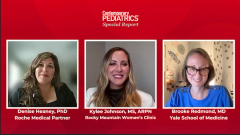
Special Report: Challenges and Workflow Integration in STI Care
Experts emphasize the critical role of access and early detection in maternal-fetal health, highlighting the need for improved STI testing and collaboration.
Episodes in this series

In part 4 of this 7-part Special Report, our panel of subject matter experts explores the importance of access and early detection in protecting maternal-fetal health. Brooke Redmond, MD, explained how increasing access to sexually transmitted infection (STI) testing is especially critical in pediatrics because of its downstream impact on newborns and infants. Many congenital infections—including syphilis, HIV, hepatitis B, and chlamydia—may be clinically silent in the early newborn period, yet have life-threatening or lifelong consequences if missed. For pediatric clinicians, this underscores why expanded maternal screening during pregnancy and delivery is so vital.
She noted that pediatric providers frequently depend on information gathered from maternal testing—serologic results and diagnostic assays that obstetric teams conduct throughout pregnancy. These results guide neonatal teams in determining whether prophylaxis, modified delivery planning, or early treatment is needed. Infections like congenital syphilis illustrate how complex this can be: with varying phases and presentations, it requires precise screening and coordination between maternal and neonatal care.
Redmond stressed the importance of multidisciplinary collaboration, where the mother’s team and the baby’s team work seamlessly together, sharing critical lab information and anticipating next steps. As testing becomes more accessible, including at-home and point-of-care innovations, pediatric clinicians must be prepared to interpret results, counsel families, and act quickly to prevent transmission or initiate treatment. For pediatrics, the value of diagnostic innovation is clear: it equips providers with the chance to intervene earlier, reduce stigma around testing, and ultimately safeguard child health from the earliest stages of life.
Our Experts:
- Kylee Johnson, MS, APRN, is a women’s health nurse practitioner at Rocky Mountain Women's Clinic.
- Brooke Redmond, MD, is an attending neonatal critical care physician at the Yale New Haven Children’s Hospital. She is the creator and director of the 24/7 BABY program.
- Denise Heaney, PhD, is a senior scientific affairs manager in Diagnostics Information Solutions at Roche Diagnostics Corporation in Indianapolis.
Redmond and Johnson have no relevant disclosures to report. Relevant disclosures for Heaney include Roche.
References:
Hufstetler K, Llata E, Miele K, Quilter LAS. Clinical Updates in Sexually Transmitted Infections, 2024. J Womens Health (Larchmt). 2024;33(6):827-837. doi:10.1089/jwh.2024.0367
World Health Organization. Guidelines for the management of asymptomatic sexually transmitted infections. Published 2025. Accessed September 30, 2025.
https://www.ncbi.nlm.nih.gov/books/NBK616637/
Newsletter
Access practical, evidence-based guidance to support better care for our youngest patients. Join our email list for the latest clinical updates.







